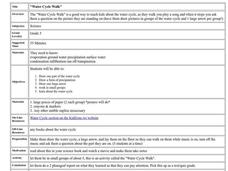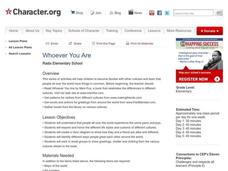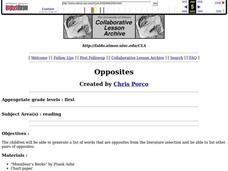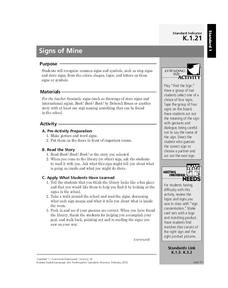Curated OER
Language Arts: Five Senses Walk
First graders take a discovery walk around the school. They use their observations to compose a class book about their school.
Curated OER
Water Cycle Walk
Students investigate the water cycle. In this water cycle lesson, students listen to a song as they walk around and when they music stops, they answer a question based on the water cycle.
Curated OER
High in the Sky with Fluency
Students practice reading orally to increase speed and fluency in this lesson. The teacher models fluent reading by reading orally the book "Arthur's Reading Race." The students then work with a partner taking turns reading and...
Curated OER
Exploring Alaska Foilage In Russian
Seventh graders investigate the concepts of how plants are part of daily culture in Russia. The skills of naming different plants is practiced. Students take a survey of the nature that is found in the area in which they live. This is...
Curated OER
Future Actions
How do you conjugate a reflexive verb? This plan suggests reading a children's book to your intermediate Spanish speakers. Follow the reading with a PowerPoint slide show that presents reflexive verbs, a sentence using the verb, and a...
Curated OER
Media Literacy Vocabulary Lesson
Students participate in an introductory lesson that focuses on communication. The two types of extrapersonal and interpersonal are covered. The lesson uses questions in order to guide the class discussion and writing responses.
Curated OER
Idioms: Get the Ball Rolling
Based on books written by Fred Gwynne, particularly A Little Pigeon Toad, this resource connects the language of idioms and figures of speech with visuals that make explicit the often humorous connections between the literal and...
Curated OER
Whoever You Are
Students examine cultures, traditions, and feeling throughout cultures. For this cultural lesson, students use literature, maps, and cultural information to examine how people have universal feelings despite their different cultures and...
Curated OER
Crayon Resist
Kids usually love crayon resist projects. It is so fascinating for them to see how the dark paint accentuates and resists the waxy crayon. Here are instructions for executing a crayon resist project of your own. Tip: Make the project fit...
Curated OER
Analyzing Short Biographies to Discover Characteristics of Biographical Writing
Students read short biographies on Abraham Lincoln from various artists. Using the texts, they identify the subject of the biography and discuss whether or not illustrations contribute to a biography. They research specific information...
Curated OER
Fill a Jar
Sometimes short instructional activity outlines are enough to give you a great idea. Young writers draw any object inside an image of a jar, that doesn't belong in a jar. They can draw a tree, truck, or dinosaur. Tip: Have kids write a...
Curated OER
Pudd'nhead Wilson: Guided Imagery
Inspire thought around some of the themes of Pudd'nhead Wilson with a visualization activity. As you read a passage, learners close their eyes and picture the scene. A writing exercise and discussion follow.
Curated OER
Long Vowel Phoneme - ai
Kindergarteners identify the long vowel sound /ai/ in speech and writing. The whole class shares the book, Daisy the Snail, then brainstorms as many /ai/ words as they can. The class constructs a word wall with the /ai/ words.
Curated OER
Edible and Medicinal Plants: Field Trip Guide
Though it's designed to guide a field trip to the New York Botanical Garden, you could take resource like this one to a local park, wilderness area, school garden, or even a weedy empty lot. Middle schoolers identify plant parts and...
Curated OER
Orienteering - Introductory Lesson
Gain knowledge of directions and degrees while learning how to read a compass. NEWS - north, east, west, south, and everything in between. It's crucial to be accurate in reading a compass and understanding degrees and direction when...
Curated OER
Rosie's Walk
Students use maps and globes to locate and describe locations, directions and scale. Using the maps, they identify man made or natural features of different environments. They practice using geographical terms to describe a specific...
Curated OER
Opposites
First graders take a picture walk through of the big book "Moonbear's Books" and make predictions on what they think is happening. Echo read to check predictions. Students generate words that are opposites on chart paper.
Curated OER
Signs of Mine
In this reading and life skills lesson plan, students practice recognizing common signs that would see around town and at school. Examples are, stop signs, exit signs, etc. After a class discussion where examples are given, students tour...
Curated OER
Mrs. Wishy Washy
Students explore the book, Mrs. Wishy Washy. They listen to the story, participate in a picture walk, identify the patterns of repeated words, role-play the motions, and retell the story using props.
Curated OER
Exercise and Water
Second graders discover the needs of their body by trying different types of aerobic exercise. In this physical education lesson, 2nd graders analyze The Busy Body Book by glancing at the pictures inside and predicting what the...
Curated OER
The Enormous "Kinder" Garden
Students discover books about planting enormous things. In this reading lesson plan, students experience several books centered around growing enormous plants. Cross curricular activities are included
Curated OER
Cloudy With a Chance of Meatballs
Students write a short description similar to "Cloudy With a Chance of Meatballs," describing their own favorite food, and what kind of weather it would be in the story. they continue to observe the weather outside of our classroom.
Curated OER
Quiet On The Set... Take 1...Action!!
Students complete an activity with the book Step by Step by Bruce McMillan. In this verb lesson, students create a list of action verbs from this book and more to use in their own writings. They will create stick puppets to act out the...
Curated OER
Eatem Up!
Students identify, interpret and demonstrate a positive learning attitude. They identify, comprehend and use basic concepts and skills and then, communicate clearly in oral, artistic, written, and nonverbal form. Students also identify...

























